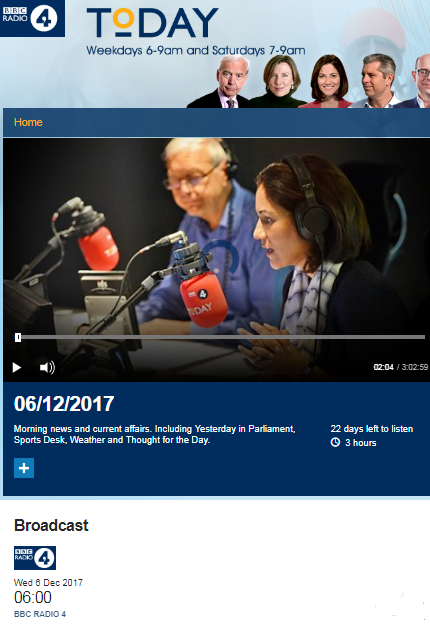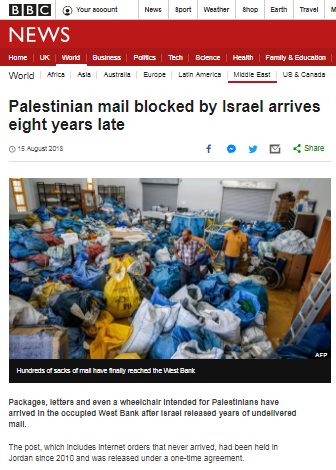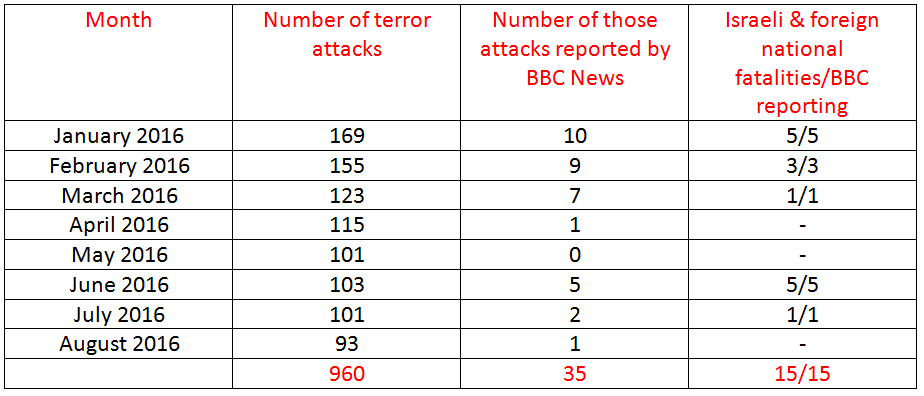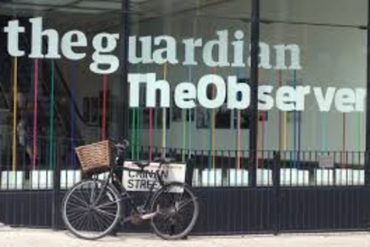The December 6th edition of BBC Radio 4’s flagship news and current affairs programme ‘Today‘ included several items relating to what was at the time an anticipated announcement by the US president concerning Jerusalem and the transfer of his country’s embassy to that city.
In addition to reports from the BBC’s own Yolande Knell, Barbara Plett-Usher and Jon Sopel, listeners heard two interviews conducted by presenter John Humphrys in which very different styles of interviewing were evident.
The first interview (from 01:34:40 here) was with the mayor of Jerusalem and in his introduction Humphrys erased the religious significance of that city to Jews from the picture presented to listeners.
[emphasis in italics in the original, emphasis in bold added]
Humphrys: “There is no more sensitive issue in Middle East peace negotiations than the status of Jerusalem. The Israelis claim it as their capital and treat it as such but it’s alone in that. For the Palestinians and every Arab country it is a sacred city. Every foreign country has its embassy not in Jerusalem but in Tel Aviv. That may be about to change. Today President Trump is going to make a speech which will, it seems, reverse decades of American policy by announcing that the American embassy in Israel will move from Tel Aviv to Jerusalem and thus effectively recognise the ancient city as Israel’s capital. I’ve been talking about that to the mayor of Jerusalem Nir Barkat who welcomed what Mr Trump is going to say.”
Barkat: “I applaud the president of the United States, President Trump. Indeed he said in his campaign that he will recognise Jerusalem as the capital of Israel and move the embassy and for us to see him take action on his campaign promise is meaningful and it’s a very important day for Jerusalem today.”
Humphrys: “Well it may be an important day for Jerusalem but for the Middle East as a whole it’s highly provocative, isn’t it?”
Barkat: “I don’t think so. I think we have a brave president that understands the Middle East. He understands that in any peace scenario Jerusalem is the capital of the Jewish people. Jerusalem is the capital of the Jewish people for the last three thousand years and the Bible says so. We recognise that and for us to see a world leader like the president of the United States come and look forward and understand that, if anything, this will contribute to the peace process, to very…to stability, for the world to understand that Jerusalem is the capital of the Jewish people regardless of any peace process or it’ll help the peace process, I think is meaningful.”
Humphrys: “Well so long as you believe that that’s fine but that is not what the rest of the world believes and your own Brigadier General Michael Herzog who, as you will know, serves in…served in very senior positions in the IDF and he’s been an Israeli peace negotiator – he says he is worried that extremists – Hamas etcetera – will use this as a rallying cry and Mr Trump should think very carefully about the impact his statement will have.”
Barkat: “Well I recognise that there are people that have different thoughts on the issue; that’s very clear. But I want to tell you one more thing: Israel would never exist if we would be afraid of threats made by our neighbours. Now we have to recognise…do the right thing. We’ll align interests with our partners around the world like the United States and others – and there are many, many others – and no deter from doing the right thing because of [the] threats of terror and other organisations. I have to tell you; about two years ago we had a round of violence for no reason. So the point is that you’ve got to make [do] the right thing and defend ourselves if, God forbid, they try to deter the decision – the terrorists – from doing the right thing we will overcome.”
Humphrys [interrupts] “Well there is no doubt…there is no doubt that they will try to deter you [sic] from doing this because for them there is no more sensitive issue and it isn’t just the Palestinians saying this, is it? It’s the Arab league talking about dangerous measures that would have repercussions. Saudi Arabia: ‘detrimental to the peace process’. Jordan: ‘it will provoke Muslims and Christians alike’. Turkey: ‘we may cut off diplomatic relations with Israel’. The consequences will be massive, won’t they?”
Barkat: “I don’t think so but I understand why people…”
Humphrys [interrupts]: “You don’t think so?”
Barkat: “No. I think that we have to do the right thing period. Look, if somebody threatens you and you deter he will continue threatening you and you’ll never get anywhere.”
Humphrys then managed to erase Hamas and additional terror organisations from the story:
Humphrys [interrupts]: “But you’re not being threatened over Jerusalem as we speak, are you? Nobody is trying to throw you out of Jerusalem.”
Barkat: “Well that’s the absurdity. I think what you’re basically saying to me [is] that there are people that are threatening us – extremists, radical Islam and others and maybe other people that have [unintelligible] opinions about Jerusalem are threatening in all ways…in all kinds of ways…”
Humphrys [interrupts] “No. What….”
Barkat: “If you’re asking me if we should deter from doing the right thing, the answer is definitely not.”
Humphrys then presented the Palestinian Authority’s narrative on this issue a fact:
Humphrys [interrupts]: “They want…what…yeah, but what they want is…is…is a two-state peace process and this will destroy that process – completely.”
Barkat: “I don’t think so. I think recognising Jerusalem as the capital of Israel is not…is not saying anything. But as a matter of fact, the opposite. In any scenario Jerusalem is the capital of the Jewish people period. Now if you don’t recognise that and you don’t want to have peace it will be very unfortunate. But that is something that is not negotiable from the Israeli side and, you know, hopefully people will understand and accept…and accept that historic fact and thank God if everything goes right it’s the reality and the future.”
Humphrys: “Nir Barkat – many thanks for talking to us.”
Leaving out the introduction, this interview lasted just over four minutes, during which Humphrys interrupted his interviewee on five occasions and spent well over a quarter of the time (1 minute and 14 seconds) speaking himself – including lengthy statements .
Later on in the same programme Humphrys conducted a longer interview with a Palestinian official and in part two of this post we will see how the interviewing technique used differed and what the BBC chose to do with both those interviews.




